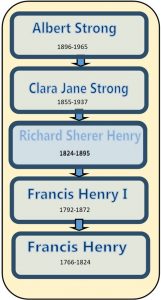
Our Henry Family
We are linked to two Henry families, as Samuel McConoughey married Louise Henry, of Blandford, MA, and Edward Strong married Clara Henry of North Benton, OH. No close connection between those families is likely, although both families came to America from Northern Ireland as Scotch Irish. The Henry’s from the McConoughey family arrived in New England in the 1700s, while the Strong’s Henry family more likely were immigrants through the Delaware valley ports of Virginia, at about the same time.
Dora Henry, my grandmother Clara’s niece, and daughter of Great Uncle Orrin Henry was the author of a well-researched genealogy of the North Benton Henrys. The earliest family she could document as our relative was Francis Henry (1766-1824) of Poland. There are numerous Francis Henry’s in this discussion, so they will be identified by their date of birth and death for clarity. The wife of Francis (1766-1824) was named Agnes as noted from his will. She is identified as Agnes Carson, but at this time, there are two versions of her background. Dora Henry believes she is one of two sisters who migrated to Delaware and are part of the Reed family history while Ancestry records identify her as being from Cumberland County, PA. This will be discussed further in a paragraph dedicated to Agnes Carson.
Click on this tab for The complete genealogy Francis Henry Family genealogy
Clara Henry Strong
Clara was born in Deerfield, near North Benton in 1855, the second of 7 children. Her parents were Richard Sherer Henry and Caroline Hartzell. She married Edward in 1885, making them both 30 years old when they married. Edward had been at a health spa near Pittsburgh when they began communicating by letter and then married when he came home to the family farm in Berlin Center. In the town of North Benton they would have known each other from childhood. They had two children, Ola, and Albert.
Clara was a difficult woman who had strong opinions about everything and liked to run things her way. She contrasted with Edward, who was very mild-mannered. I remember several occasions when she engaged in shouting matches over trivia. One involved milk strainers. When one-time use cotton filters were introduced and were required, she insisted that it was simply a waste and made a terrible scene insisting that she could make up re-usable filters to fit in the funnel-like fixture designed for the cotton filters. She carried on at great lengths, although in this instance she did not prevail because the new cotton filters were required by state inspectors.
Clara appeared frail but was very capable. She insisted on splitting her own kindling for the wood stove in the kitchen and the fireplace in the back kitchen. She kept an axe that no one dared to touch. It was razor-sharp and was about ¾ the size of an average axe. I have seen her split firewood 1/2 inch thick while holding the small log with her other hand. She was good, or she would have had less than 10 fingers.
She died in the summer of 1939. In the previous winter, she had fallen and broke her hip. This was the second time and she did not recover. She opposed being in the hospital. After her first fall, a couple of years earlier, her planned treatment was to be in traction for 2 or 3 weeks. She raised such a fuss, among other things, throwing food trays at the nurses, that they took her back to the operating room, pinned her hip and sent her home. She picked cherries from a large cherry tree using her favorite ladder the following summer.
Belle kept her distance from Clara. I do not remember her ever spending time at the old farm. As a result of Clara’s difficult personality, Belle and Albert had a deal. Albert took care of the barn and Belle took care of the house.
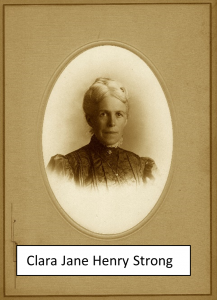
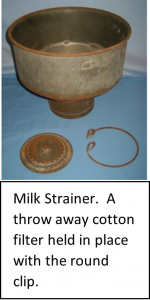
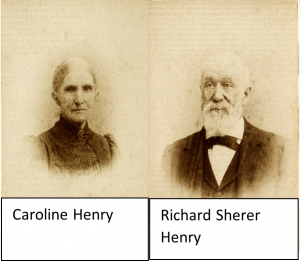
Richard Sherer
Richard Sherer Henry was born 11/22/1823 in Poland, OH, and died 10/14/1895. He is buried in the Hartzell Cemetery. His wife was Caroline Hartzell, the daughter of Abraham and Sarah Smith Hartzell. (Sarah’s father was the developer and designer of North Benton. See the history of North Benton.) Richard and Caroline operated the farm in Deerfield and raised seven Children
Minerva Ann b. 9/19/1852 d. 12/3/1861
Clara Strong b. 9/21/1855 d. 6/3/1938 m. Edward Strong 6/25/1885
George Abram b. 1/22/1858 d. 8/28/1928 did not marry
Joseph Hartzell b. 11/10/1859 d. 4/29/1920 m. Edna Gunder
John Irvine b. 11/6/1851 d. 5/6/1926 m. Mary Wagner
Sallie Hanna b. 8/31/1865 d. 9/30/1928 m. Joel Malmsberry
Orrin Francis b. 5/27/1865 d. 10/27/1943 m. Myra Theresa McGowan
Orin Henry bought the farm adjacent to Hartzell Road and Western Reserve Road in Deerfield Twp. He converted half the farm into a 9-hole golf course and resort which became The Sebring Country Club. His facility included cottages, including two log homes. We swam in the ponds and I sold vegetables out of my bicycle basket to women in the summer cottages.
I was 15 years old when he died, and I remember the day Orin died. He had asked me to help him with some fence repairs. I went to the house about 8 in the morning and was met by his wife Myra who shocked me with “Orin didn’t feel very well after doing the chores, so he went in to take a little nap. I just tried to wake him and think he has died.” Sure enough, she was correct. Orin was a regular at the North Benton Presbyterian Church. He loved to argue religious theory. They asked my mother to teach the Senior Class, which he attended. Mother was concerned about his argumentative positions, but he treated her very well and she enjoyed the experience. She taught the Sunday School Class for years. I do not recall Orin and Grandmother Strong having any contact.
Francis Henry I (1792-1872)
Francis I (1792-1872) was probably born in Washington County, PA. The year but not the date of his birth is on his tombstone in the Hartzell Cemetery. He served in the war of 1812 as a private in Captain Hines Company of the Ohio Militia and drew a pension. He also received a veteran’s land grant of 120 acres in Iowa. This property was transferred to his son, Harrison Henry in 1855.
As the oldest son, Francis inherited the family farm in Poland after his father’s death in 1824. He married Jane Sherer on June 19, 1819 and they lived and farmed the original homestead in Poland until a few years before his death when they moved to North Benton to live with their children, Richard Henry, and Nancy Hartzell.
Francis Henry I and Jane Sherer had nine children:
William b. b. 6/11/1820 d. 4/`15/1893 m. Margaret Adams
Nancy b. 6/2/1822 d. 1/15/1898 m. Simon Hartzell
Richard Sherer b. 11/21/1823 d. 10/14/1886 m. Caroline Hartzell
Mary Ann b. 10/15/1825 d.
Elisa b. 5/13/1827 d. 10/25/1905 m. Chauncey Rice
James b. 1/25/1829 d. 1/8/1851 m. Agnes Cowden?
John b. 1/11/1831 d. 10/6/1907 m. Sarah Forney
Harrison b. 4/11/1833 d. 1836 m. Belinda McCreary
Sarah Jane b. 9/15/1835 d. 5/18/1915 m. Joseph Clark Kennedy
Francis Henry (1766-1824)
Francis Henry’s (b. 1766) is the first generation for which we have solid information. He is listed as being born in the Augusta District of Virginia, but to date, we lack verification for the information, and if this is true, the family was in the area only 3 years after the conclusion of the French Indian War, making the data questionable. The Augusta District of Virginia was not identified as such until 1774. The following section summarizes the Augusta District of Virginia from Wikipedia and other internet sources.
Augustus District Virginia
This was a contested area, later divided between Pennsylvania, Maryland, and Virginia. Aside from family tradition, two sources show that Francis Henry moved from Washington County to Poland, Ohio. He bought the property in Poland, Ohio as shown on the property Deed while living in Washington County, Pa. His son, John, was born in Chartiers Township, Washington County in 1797 as documented in his well-researched biography. So, Francis did live in Washington County, PA to Poland during the early years of his marriage. Probably all of his children were born there.
For a period of time, some settlers in the Augustus District registered their property and paid taxes to Virginia while neighbors were paying taxes to Pennsylvania. The problems almost resulted in a shooting war between the states. Both colonies claimed the area. Pennsylvania identified the area of Washington County as part of Cumberland County in 1750, made it part of Bedford Co. in 1771, changed it to be part of Westmoreland Co. in 1773, and finally established Washington County in 1781.
Virginia considered the area as part of Augusta County, VA, and later established it as the Augusta District. Virginia encouraged settlers to move to the area and provided military protection beginning in 1756, two years after the Battle of Fort Necessity which was considered the beginning of the French Indian War. Pennsylvania forbid settlement in the area until 1768, but settlers came anyway and claimed the property as squatters. The area was also claimed by the French until after the French Indian War although they abandoned Fort Duquesne in 1758, during the French Indian War.
French traders maintained profitable Indian trading posts in the area as late as 1768. Virginia needed land for expansion because plantation owners had an overpopulation of slaves and more land was needed to support them. Young George Washington was sent to the area in the attempt to remove the French, who built a line of forts between Eire and Fort Duquesne. French simply told him they had prior claims. Following the French Indian War, the French traded all the land East of the Mississippi River to England for two Caribbean Islands. However, England tried to block settlement west of the Allegheny Mountains because they could not afford a war with the Indians. This explains Pennsylvania’s reluctance to develop the area, but Virginia continued to push land development in the area and even established land companies to develop settlements along the Ohio River because plantation owners in Virginia needed more land to support their excess slave population and so they established land companies to distribute low-cost land in the Ohio Valley against the desires of England.
More on Francis Henry
There at least three Henrys listed in Washington County census and tax records but a clear connection to our Francis Henry has not been established. Ancester.com records show parents for our Francis, but no evidence or sources. These Washington County Henrys are noted in Dora Henry’s genealogy, as she and her genealogists studied them, but they found no evidence to make connections. I could not locate data through the internet or Ancestry that had not been found by Dora and her genealogists. Our Francis Henry is not listed on any census or tax records, indicating that he did not own property during his stay in Washington County. In 1801 when he was 35 years old, he paid $218 in cash, a good sum in that era, for the land in Poland deed verifies that he lived in Washington County when he bought the property. It is also a large piece of money that would have come from savings, indicating he had a well-paying skill, and inheritance, or from a wealthy wife.
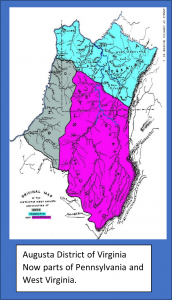
Many questions arise when trying to validate these claims and attempt to locate his father. Hopewell, PA is mentioned in the records. There are four Hopewell townships and towns in Pennsylvania. One is close to the Ohio border, east of Pittsburgh, and would have been deep in the wilderness in the late 1700s. One of them is only 50 or so miles away, in Beaver county, and encompasses the town of Aliquippa, and is near an active French trading post. The other two towns are well east of the area. A reasonable assumption is that the Hopewell associated with our Francis is West of Pittsburgh, near the Ohio border and is in Washington County rather than Beaver County. This is also closest to Chartiers where his second son John was born.
Our Francis Henry (1766-1824) married Agnes Carson about 1791. She is clearly identified as Agnes in her will. They had six children.
The family moved from Pennsylvania to Poland, Ohio about 1803. Francis bought the property in 1801 and probably traveled seasonally to the new property to prepare a cabin and clear land in preparation for the move. No tax records have been found indicating our Francis owned property in Washington County and he is not listed in the 1790 Census for Washington County, but he had managed to accumulate enough funds for the land purchase in Poland. The land is within the Western Reserve or New Connecticut as it was known then and was purchased from William Law, of New Haven Connecticut who had bought a block of land from the Connecticut Land Company for resale.
Francis (1766-1824) died in Poland in 1824 and is probably buried in the old Poland Cemetery. According to Dora Henry’s genealogy, there is a large family lot there with one stone for a grandson, but otherwise devoid of gravestones.
According to his will, his wife was named Agnes, and family records indicate her maiden name was Carson. In a Reed family genealogy, it is claimed that she was one of two sisters, Agnes and Margaret who migrated from Ireland to New Castle, Delaware. One married Francis Henry and the other James Reed. James was a Revolutionary War soldier, and he enlisted in the Philadelphia area, which is not too far from New Castle. It this version is true, it is probable that Francis was raised in Delaware or Chester County, Pennsylvania. Records in Ancestry indicate that our Agnes Carson was born in Cumberland County, Pa. However, he may have come to Augusta District from Virginia.
John, a son, became a well-known minister working out of Austintown, OH. A book by A.S. Hayden provides a biography for him and according to the book, he was born in Chartiers Township, Washington County PA on October 1, 1797, and moved to Ohio about 1803. This confirms that the family moved in1803 and that they were in Chartiers Township. The author knew John and claims he only published carefully researched knowledge.
One Francis Henry lived in Cecil township, Washington County. Pennsylvania Tax and exoneration rolls list him in 1785 (2 horses and 1 Cow), 1787 (2 horses and 2 cows), 1788 (2 horses and 2 cows), and 1789 (2 horses and 2 cows). He is listed on the Pennsylvania tax list for 1790. Cecil township is adjacent to Chartiers Township where our Francis Henry’s (1792-18 brother John was born in 1797. This Henry is listed in some genealogies from Ancestry.com as our Francis Henry that moved to Poland in 1803. While this is a nice theory, Cecil County Francis Henry’s wife was named Eleanor and records show that he died in a fire on December 25, 1824. Dora Henry cited veteran pension records and Washington County record of his will, File H-29-1825 closed out in 1831. Legal representation other than the administrator is listed as Joseph Kerr and Elizabeth (her mark X) Henry. It is possible that Francis Henry was our Francis Henry’s father, but at this point, there is no documented path to verify the connection. The Ancestry records identify his wife as Eleanor Agnes Henry, but no records verify the name. Ancestry.com records indicate that Francis’s wife came from Cumberland County. These contradictions offer some fertile areas for future research.